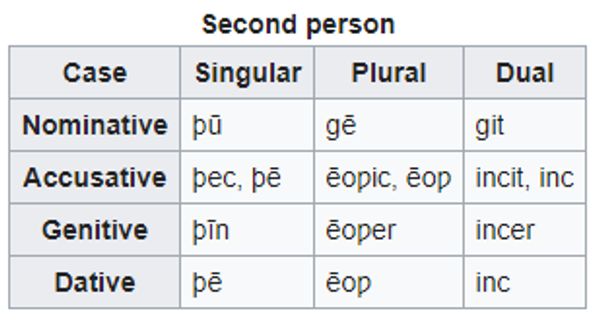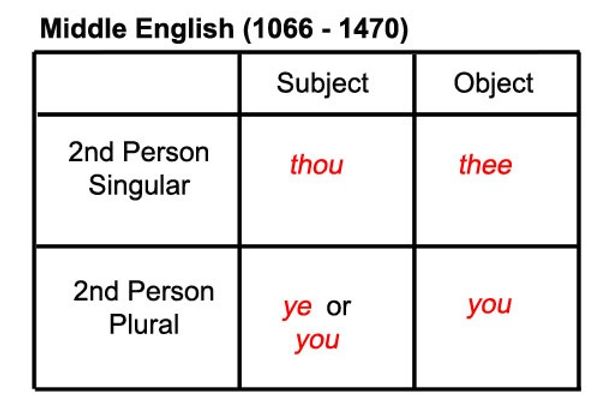What is the plural of 'you'?
As anyone who is learning English will know, you will have come across the fact that English seems to be missing a way to address more than one person, but does it really?
To answer this question, we need to look back into English's history when it was still firmly Germanic. As one would expect, Old English resembled something closer to Modern German than it does to Modern English. Old English had five different noun cases: nominative (subjects), accusative (direct objects), dative (indirect objects), genitive (possessive), and instrumental (an object used to achieve something else, Modern German has dropped the instrumental case but retains the other four).
If we look at the word 'you' in Modern English, we use it for subjects ('You went to the beach'), direct objects ('I love you') and indirect objects ('I gave you the ball/I gave the ball to you'). But if we look at how English was spoken before the Norman Conquest, we can see a much wider variety of words:

Taken from: https://en.wikipedia.org/wiki/Old_English_grammar
As you can see from this table, Old English had four cases and three different numbers: singular, dual (2), and plural (3+). Note: the þ (called the 'thorn') is pronounced like the 'th' sound in 'this' and bears resemblance to the German 'd' sound (such as 'du', 'dich', 'dir', 'deiner', for example) which is used for the second person singular form. The ƿ (called the 'wynn') is a /w/ sound.
With the Norman Invasion of Great Britain, or the time when French started to have an influence on English, we can see a shift in the language, including the import of thousands of Latin words, moving from the flexible sentence order inherent in Germanic languages to a stricter, Latin-influenced structure, and the parallel nature of Germanic/French words in the English language (e.g. pig/pork, chicken/poultry, calf/veal, cow/beef, sheep/mutton, wood/forest, house/mansion, worthy/valuable, etc.)
Here we can see the second person pronouns used during this time:




Modified table (removal of all non-second person forms) from: https://en.wikipedia.org/wiki/Middle_English
We can see here that the singular pronouns weren't influenced much by French while the plural ones have changed radically, so why is this? After the Invasion, the aristocracy was replaced by French nobles who came with William the Conqueror, so the language of the upper echelons of society at the time was French while the people's language remained English. Therefore, in order to refer to someone of a higher social status than you (for example, peasants speaking with anyone who wasn't a peasant), they would have to use the formal form. In French, formality is shown by using the plural form, so the same was adopted in this form. So a peasant speaking to a lord would use 'ye'. Fast forward to around the 1400s (think Chaucer) and the two languages have fused into Late Middle English. This language is being used for all official documents with the exception of Church documents (still used Latin) and legal documents (in legal French).
As you can also see in this chart, Middle English has lost the Genitive case and instead uses a possessive pronoun that is called a 'possessive case', although it really isn't a case. At the same time, the accusative and dative objects (not only for second person but for all people) became the same. Note: Modern English still has something called the 'Saxon Genitive', which is where we use the 's at the end of words as was done in Old English, and some adverbial genitives which didn't die out with the rest of the genitive case (words such as 'once' and 'afterwards').
To simply the chart (including transliteration to the modern alphabet) from Wikipedia to only look at the Nominative and Accusative cases (Subject and Object, which are the ones today that uses the same word), we have:

Here it is easier to see that the modern 'you' comes from the second person plural form, which as was mentioned was used by people of higher status than yourself. Over time, this also came to be used with strangers.
Early Modern English (think Shakespeare) kept these Middle English pronouns (i.e. Shall I compare thee to a fine summer's day?) while going through the Great Vowel Shift. Around the 17th century, the other forms were dropped and 'you' was left to reign supreme over the second person subjects and objects.
Perhaps somewhat surprisingly (or perhaps not depending on your viewpoint), this phenomenon has happened in other languages as well. In the Brazilian Portuguese, the second person informal was also dropped in favour of the formal 'você' for subjects. The informal, 'tú', is only used when speaking to God. In Spain, the use of Usted and Ustedes (formal singular and plural) is also dropping in everyday speech in favour of 'tú' and 'vosotros/vosotras' (informal singular and gendered plurals).
An interesting, additional phenomenon for some dialects of English (especially ones found in the US) is a resurgence of different second person plural forms. Some examples include 'you all' (also abbreviated to y'all), 'you guys' and other variations in distinguish the plural from the singular. In other dialects, the word 'you' continues to be used both in singular and plural instances.
9 juillet 2018





